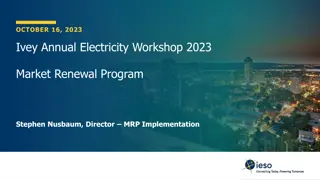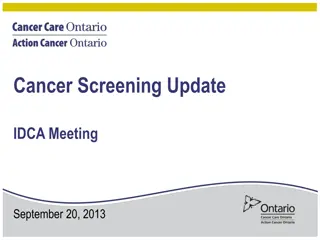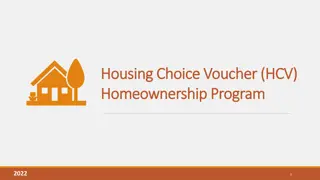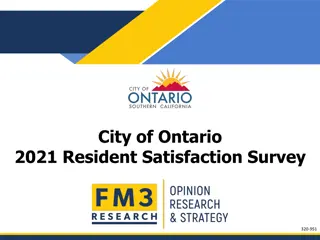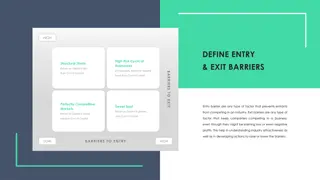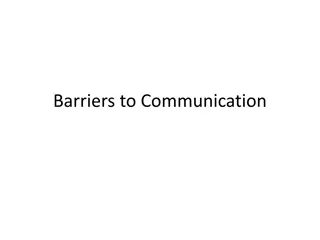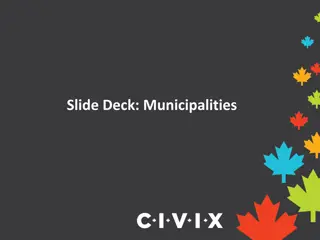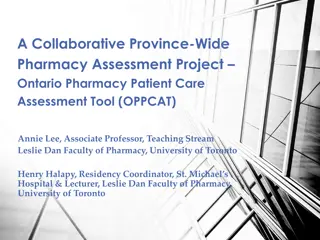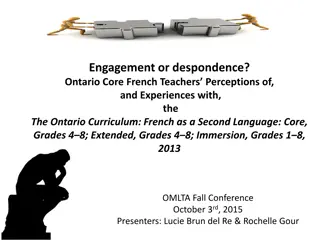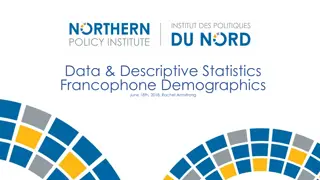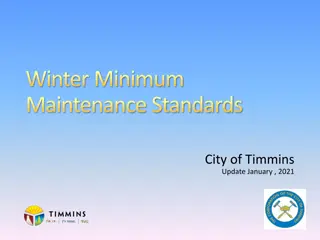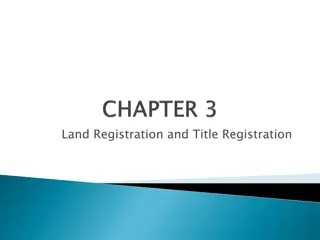Understanding Perceived Barriers to Homeownership in Ontario
Survey in Ontario explores renters' awareness and willingness to access non-traditional mechanisms for entering the housing market like rent-to-own and shared equity models. Results indicate increasing challenges for young Canadians to own homes. Government promoting alternative approaches. The study conducted in partnership with Ourboro presents implications of shared equity models. Purchase intent survey data reveals trends in housing plans among Ontarians.
Download Presentation

Please find below an Image/Link to download the presentation.
The content on the website is provided AS IS for your information and personal use only. It may not be sold, licensed, or shared on other websites without obtaining consent from the author. Download presentation by click this link. If you encounter any issues during the download, it is possible that the publisher has removed the file from their server.
E N D
Presentation Transcript
Abstract A survey of Ontarians was conducted to deepen understanding of the perceived barriers Canadians face to entering the housing market. The survey specifically focuses on the awareness and willingness of renters to access non-traditional mechanisms of entering the market including rent-to-own, shared equity models, and co-ownership. This presentation will share the awareness levels of Ontarians of these different models and explore results of a survey experiment, which presents the shared equity model using two different frames. Implications of these findings will be explored. The study is being conducted in partnership with Ourboro, a social purpose organization which uses the share equity model to help Canadians purchase a home.
Our Apperception of Homeownership Paths Dr. Domenica De Pasquale Dr. Anthony Piscitelli Dr. Sean Geobey
Homeownership Purchasing a home has historically been the means of secured shelter and providing security for retirement (Fortin, 2018; Statistics Canada, 2022) Housing investments increased by over 200% from 2005 to 2021 (Vitals Signs, 2021) Many young Canadians now unable to join the housing market (Moffatt, 2021; Moffatt, Atiq & Islam, 2021)
Alternative Homeownership Paths The Canadian government has begun to encourage alternative approaches to facilitating homeownership rent-to-own, shared appreciation mortgages, equity co-operatives, co-ownership, and halal mortgages Awareness and willingness to explore alternatives to purchase a home has not yet been explored
Survey Information Partnership with Ourboro Online survey conducted from February 2, 2023 to February 17, 2023. Responses were collected by the online panel company Cint. Total sample size was 2086. Renters were oversampled to allow for more detailed examination and comparisons of renters' opinions. Results have been weighted by age and gender, region, and rent/own unless otherwise noted.
Purchase Intent Index Creation
What are your housing plans in the next 12 months? All Responses (weighted) Renters Only (unweighted) From 2017 to 2022 approximately 23% of Ontario rental households purchased their first home. Intent to purchase, therefore, likely runs significantly ahead of likelihood to purchase in the next year. Purchase a home or condominium 16% 20% Stay where you are 76% 59% Move to a new rental unit 8% 21% Statistics Canada (2022, July 21). Household characteristics, by tenure including first-time homebuyer status Accessed from: https://www150.statcan.gc.ca/t1/tbl1/en/tv.action?pid=4610006301&pickMembers%5B0%5D=1.24&pickMembers%5B1%5D=2.1&cubeTimeFrame.startYear=2021&cubeTimeFrame.endYe ar=2021&referencePeriods=20210101%2C20210101
Purchase Intent Index These five questions were combined into a single index , called the purchase intent index to compare to other questions. The index measures renters' interest in purchasing a home. What are your housing plans in the next 12 months? Purchase a home or condominium 20% Stay where you are 59% Move to a new rental unit 21% In the Next Two Years Next Five Years Would Like to purchase Will most likely purchase Would Like to purchase Will most likely purchase Strongly Agree 25% 15% 30% 23% Agree 33% 24% 38% 30% Disagree 24% 34% 18% 27% Strongly Disagree 17% 27% 14% 20% Note: Unweighted results
Purchase Intent Regression Analysis
Purchase Intent Index Regression Results A regression analysis was run to identify the most important variables that explained purchase intent. Higher purchase intent was found to be best predicted by: Age (younger respondents had higher purchase intent) Being willing to take on financial risk Being in a relationship (living with a partner or married) Religion being important to the respondent Having a higher level of education Having a higher household income All results noted here were statistically significant and unweighted
Changing Barriers Open Ended Questions
Challenges to Homeownership 22% Other 8% 17% No Challenges 6% Interest Rates 7% Not Interested In purchasing 9% Property maintenance 9% Additional Homeownership Expenses 3% 11% 20% Saving A Downpayment 14% 24% The Housing Market 19% 17% Personal Finances 31% 0% 5% 10% 15% 20% 25% 30% 35% Owners Renters
Accounting for all the extra expenses that come with owning your own home, property tax, repairs , insurance Price and bidding was the huge challenge....searching proper location was another - Renter - Owner Having enough money to buy being single, maintenance The market was crazy and every house was going with a bidding war which meant the houses we could afford ended up being way out of our budget and took awhile for us to find something that would actually work for us. - Renter Bill and taxes and other weird things that I hate - Owner - Renter The rising cost of house prices and interest rates. Getting the down payment together and the stress test - Renter - Owner
Alternative Homeownership Paths Option Understanding
How familiar are you with: Condominium Co-Ownership Rent to Own Shared Equity Halal Mortgage Very familiar 42% 14% 12% 7% 4% Somewhat familiar 43% 39% 39% 26% 11% Not very familiar 10% 29% 34% 37% 14% Not at all familiar 5% 18% 15% 30% 71%
How likely are you to consider a Condominium Co-Ownership Rent to Own Shared Equity Halal Mortgage Very likely 12% 7% 9% 5% 5% Somewhat likely 31% 20% 30% 21% 10% Not very likely 28% 28% 30% 35% 21% Very unlikely 29% 45% 32% 39% 64%
Consideration Index How likely are you to consider Co-Ownership Rent to Own Shared Equity Halal Mortgage Very likely 7% 15% 5% 6% Somewhat likely 26% 48% 28% 14% Not very likely 31% 25% 42% 27% Very unlikely 35% 13% 24% 53% These four questions were combined into a single index , called the consideration index to compare to other questions. The index measures renters interest in explore different models of home ownership. Note: Unweighted results
Questions & Concerns about Shared Equity Other 17% Positive Comments 1% Buying out the partner 2% General Risks 7% Overall Cost 10% Do not like the model 17% The Equity Split 22% Relationship with Parnter 38% Misunderstood the model 42% 0% 5% 10% 15% 20% 25% 30% 35% 40% 45%
I would be concerned that the investor would want to pull their investment out at a time I wouldn't be financially stable to buy them out. Also, I don't like the idea of sharing my home investment with anybody. What happens when parties disagree? Relationships dissolving Conflicts Does this also mean that the co-investor can move into the house? What happens if there is a breakdown in the relationship of those involved in the shared equity models? What kinds of people will be my housemate
Key Takeaways Cost and finances are preventing some first-time home buyers from entering the housing market There is some interest in alternative homeownership paths Low familiarity Better awareness and understanding of alternative homeownership paths is needed
Thank you Contact Information Domenica De Pasquale ddepasquale@conestogac.on.ca Anthony Piscitelli apiscitelli@conestogac.on.ca





